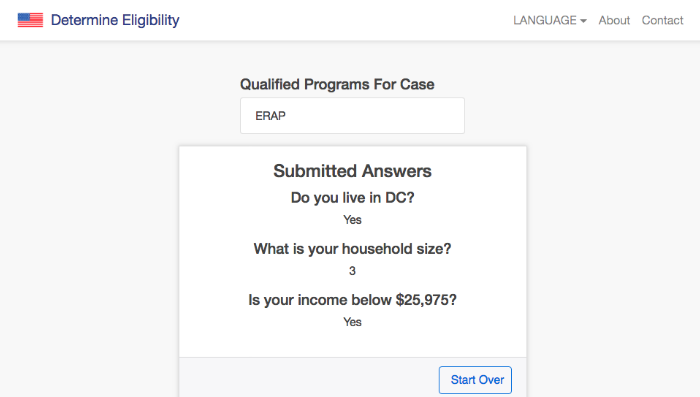DC’s Child and Family Services Agency |  Washington, D.C.
Washington, D.C.
Objectives
- Help DC Child and Family Services Agency (CFSA) caseworkers determine their clients’ eligibility for multiple programs and social services at once.
- Create a protoype of a tool and codebase that can easily be repurposed and replicated by other agencies facing similar challenges.
Findings
- Built a multi-service referral portal prototype for CFSA. The portal asks a series of simple questions and then suggests any of the CFSA programs for which the client is eligible.
- Created the eligibility-blueprint – a codebase that determines a user’s eligibility for a given program based on a set of questions. This can easily be customized and repurposed by other agencies simply by swapping the data source, program eligibility requirements etc.
Question
As part of their work, caseworkers at DC’s Child and Family Services Agency recommend beneficial CFSA programs for families in need. However, this can be time-consuming and challenging as caseworkers must filter through the various sets of eligibility criteria to determine which services their clients can access.
Many social services share eligibility criteria, but not enrollment processes and it’s likely most services are underutlized because of complex eligibility requirements and application processes. This multiple eligibility problem seems pervasive across government agencies, though federal agencies and state ecosystems are trying to help citizens determine eligibility and apply for the varied social service programs available to them.
DataKind DC and Code for DC partnered to see if they could build a tool that addresses a common problem in social services delivery: determining program eligibility.
What Happened
During the 2017 National Day of Civic Hacking, DataKind DC and Code for DC worked with CFSA caseworkers to design a tool that could determine eligibility for multiple programs at once and make recommendations for a given person’s needs. At least 11 programs are available to the clients of caseworkers at DC’s Child and Family Services Agency (CFSA), though caseworkers struggle to determine eligibility for each client in a timely manner.
During the event, volunteers built a React.js app that uses a data configuration file to define a “decision tree” of questions and answers. The application uses this configuration file to determine which questions to ask next depending on previous answers. The app was styled with a combination of bootstrap and DC web styling.
Additional features were added to the CFSA referral portal to better simulate the expected experience for the case worker: caseworkers login to search, view and select a case, then proceed to the questions. This experience was simulated with dummy data and a few additional pages before launching into the questions. A live demo can be found here.
Delivery to CFSA
CFSA was excited about the prototype. To make it really useful to caseworkers, however, they needed it to be integrated with FACES – DC’s welfare system database. Unfortunately, the collaboration with the in-house technical team required was unlikely, given competing priorities and existing obligations.
What CFSA also wanted and was feasible was a blueprint application. A blueprint application is a codebase with functionality that can be reused for different applications with configuration changes, such as a change in data source. The code to determine eligibility for or recommendation to a set of solutions based on a set of answers is common to many different applications. With the blueprint application and a set of program eligibility requirements, users can deploy an application-specific portal.
The folks at CFSA and the Office of the Chief Technology Officer (OCTO) were interested in the potential of a reusable tool to garner favor with the powers that be and this would inspire the dedication of more resources to the project. Such a reusable tool would provide high ROI on development – one tool that could improve efficiency in multiple departments.
The Eligibility Blueprint App
DataKind DC and Code for DC used the original CFSA-specific code base to build a reusable codebase and called it the eligibility-blueprint. See the live demo here.
To adapt the existing prototype as a reusable template, the blueprint app:
- Strips out DC-specific styling
- Removes the “case worker” workflow of login and case selection
- Replaces the original eligibility and programs data file with an external Google sheets source.
Next Steps
During the wrap up with CFSA stakeholders, Peter Casey, Data Scientist at DC’s Office of the Chief Technology Officer, remarked DC’s Emergency Rental Assistance Program (ERAP) is undergoing a new eligibility website experience process. ERAP presents a great opportunity to demonstrate the usefulness of the eligibility blueprint. Criteria for ERAP was gathered from the fact sheet linked on the ERAP program page. By simply swapping a URL in the application’s configuration, the eligibility blueprint app can be reused for either CFSA or ERAP.
There continues to be a lot of interest in recommendation / referral / eligibility determination apps. The eligibility blueprint app is simple, but powerful enough to be reused. DataKind DC and Code for DC want to share the tool so it can make a real impact on social services and other sectors by making it easy for different users to build their own eligibility portal.
Learn More
- Read about the 2017 National Day of Civic Hacking hackathon co-hosted by DataKind DC, Code for DC and the Office of the D.C. Deputy Mayor for Health and Human Services.
- Find out about upcoming DC events by signing up for the DataKind DC Meetup.



